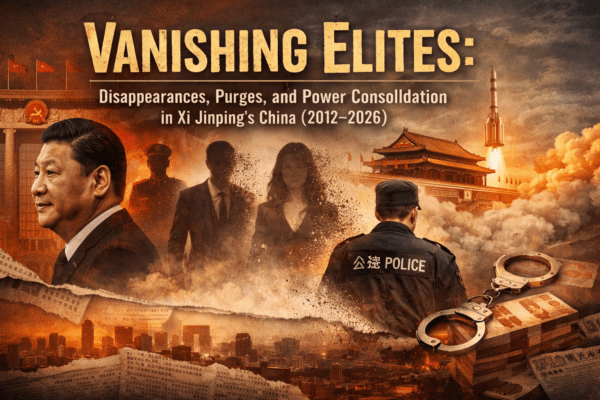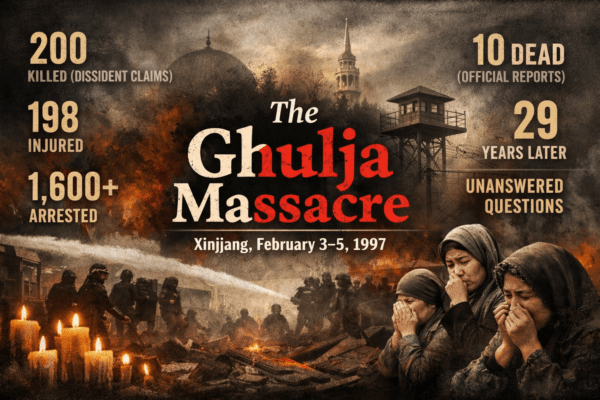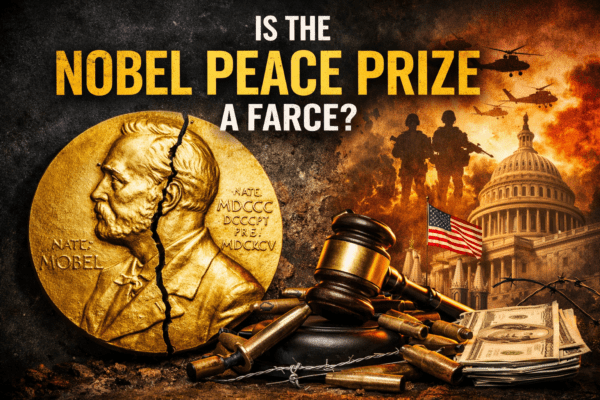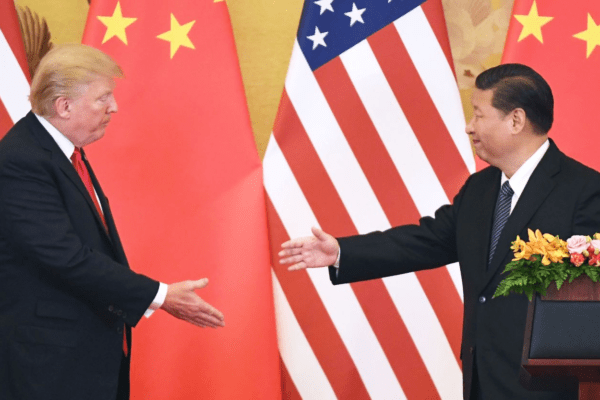
Category: East Asia

China’s Growth and destruction of the Environment
An in-depth investigative report exposing the scale of environmental damage, examining pollution, deforestation, climate impact, and policy failures while highlighting urgent solutions for sustainable recovery and global accountability.

Vanishing Elites: Disappearances and Purges in Xi Jinping’s China
Explore the wave of elite removals in China (2012–2026), including politicians, military generals, business leaders, and public figures.

Blood in Ghulja: The 1997 Massacre and China’s War on Uyghur Dissent in Xinjiang
On the 29th anniversary of the Ghulja Massacre, this report examines the 1997 killing of Uyghurs in Xinjiang, the crackdown that followed, and its lasting human rights impact.

Xi Jinping’s Military Purge Deepens: From Water-Filled Missiles to the Fall of China’s Top General
Xi Jinping is purging China’s military elite after a Rocket Force scandal exposed nuclear missiles filled with water instead of fuel and faulty silo lids, leading to the removal of top generals including Zhang Youxia and Liu Zhenli, per US intelligence reports.

Trump Warns UK Over China Ties as Starmer Seals Economic Deals in Shanghai
Shanghai | U.S. President Donald Trump has publicly cautioned the United Kingdom against deepening business engagement with China, calling such ties “very dangerous,” as Prime Minister Sir Keir Starmer continued his high-profile visit aimed at resetting UK–China economic relations. Trump’s remarks came during a media interaction in the United States, where he reacted to new trade and investment understandings reached between London and Beijing. Despite describing Chinese President Xi Jinping as a “friend” whom he knows “very well,” Trump signaled unease over Western allies expanding economic links with China, extending similar warnings toward Canada. His comments landed just as Starmer arrived in Shanghai on the third leg of a visit framed by Downing Street as pragmatic economic diplomacy conducted “with eyes wide open.” London’s Economic Re-Engagement with Beijing Starmer’s meetings with President Xi Jinping in Beijing resulted in a series of agreements focused on trade facilitation, investment, and sector-specific cooperation. Among the most significant outcomes: The two sides also agreed to enhance intelligence cooperation targeting organized crime and human smuggling networks, an issue with direct relevance to UK domestic migration concerns. Starmer described his meetings with Xi as “very good” and said the UK had made “real progress,” arguing that Britain has “a huge amount to offer” in a relationship grounded in managed engagement rather than isolation. Washington’s Strategic Anxiety Trump’s warning reflects broader U.S. strategic discomfort with allied economies deepening commercial exposure to China amid ongoing geopolitical rivalry. While Washington has encouraged “de-risking” from China in critical sectors, European governments — including the UK — have resisted full economic decoupling. Notably, British officials pointed out that Washington had been informed in advance about the objectives of Starmer’s trip. UK Business Minister Sir Chris Bryant dismissed Trump’s comments, saying it would be “bonkers” for Britain to ignore China’s global economic weight. The tension highlights a familiar transatlantic dilemma: balancing security alignment with the U.S. against economic engagement with the world’s second-largest economy. Trade Reality vs. Security Concerns China ranks among the UK’s top trading partners, while the United States remains Britain’s single largest national trade counterpart. British business groups welcomed the visit, arguing that engagement reflects commercial reality rather than geopolitical realignment. However, critics in London warn that economic gains must not obscure security and values concerns. Opposition figures accused the government of risking national security for economic concessions, citing: Security officials maintain that intelligence agencies are involved in risk assessments linked to China-related decisions. A Broader Geopolitical Signal For Beijing, the visit signals that Western engagement with China continues despite U.S.–China strategic rivalry. For London, it represents an attempt to revive growth through trade while managing strategic risks. For Washington, it underscores the limits of allied economic alignment with U.S. China policy. Starmer’s stop in Shanghai, followed by onward travel to Japan, places the UK squarely in the complex balancing act shaping 21st-century diplomacy: economic interdependence with China, security partnership with the United States, and mounting pressure from both sides. The episode illustrates a core reality of current geopolitics — Western unity on China remains strongest on security, but far more fragmented on economics.

Parvovirus ‘Slapped Cheek Disease’ Surges Across the U.S. — CDC Issues Health Alert as Global Spread Expands
Parvovirus B19 cases are rising fast as CDC issues health alerts. Learn symptoms, risks, and global spread of slapped cheek disease in this IJ-Reportika report.

Is the Nobel Peace Prize Really About Peace?
For decades, the Nobel Peace Prize has celebrated champions of peace—but an investigation into winners from 1996 to 2025 reveals a pattern of controversy, political alignment, and actions sometimes contrary to peace, raising questions about the true purpose of this prestigious award.

China Pushes Ahead With Military Modernization Despite Tumult, Latest Pentagon Report Warns
Pentagon warns China’s military modernization is accelerating despite purges and corruption, with urgent focus on Taiwan, nuclear buildup, and regional dominance.

Airbus Secures New Chinese Orders as Boeing Leads in 2025 Net Bookings
Airbus secures $4.1 billion in new A320 jet orders from two Chinese airlines, strengthening its China position even as Boeing leads global net aircraft orders in 2025.

China Sanctions Boeing After Trump Approves $11 Billion Arms Sale to Taiwan
Beijing issues warning to Washington as cross-strait and US–China tensions escalate China has imposed sanctions on Boeing and a range of US defence firms and executives following the Trump administration’s approval of an $11 billion arms sale to Taiwan, a move Beijing has denounced as a direct challenge to its core national interests. China’s Foreign Ministry announced on Friday that 10 individuals and 20 US defence-related entities will face punitive measures, including asset freezes in China, business restrictions, and travel bans. Among the most prominent targets is Boeing’s production hub in St. Louis, Missouri, a key manufacturing centre for advanced military aircraft such as the F-15EX Eagle fighter jet and the MQ-25 Stingray autonomous refuelling drone. Other sanctioned companies include Northrop Grumman and L3Harris Maritime Services, both major players in the US defence industry. Retaliation Over Taiwan Arms Deal The sanctions follow last week’s announcement by the Trump administration of one of the largest-ever US arms packages for Taiwan, surpassing the total value of arms sales approved under the previous Biden administration. The deal includes missile systems, drones, and other advanced military equipment, though it still requires approval from the US Congress. Beijing accused Washington of undermining regional stability and increasing the risk of military confrontation in the Taiwan Strait. “The Taiwan issue is the core of China’s core interests and the first red line that cannot be crossed in China–US relations,” a spokesperson for China’s Foreign Ministry said. “Any provocative actions that cross this line will be met with a strong response from China.” Individuals Targeted Among those sanctioned is Palmer Luckey, founder of drone-focused defence company Anduril Industries, who is now barred from entering China. Luckey has previously warned that any defence planning should assume a potential Chinese move against Taiwan as early as 2027, remarks that have drawn sharp criticism from Beijing. While analysts note that the practical impact of the sanctions may be limited—given the minimal business exposure many of the targeted firms have in China—the move is widely seen as a symbolic escalation and a clear diplomatic signal to Washington. Rising Cross-Strait Tensions China claims democratically governed Taiwan as part of its territory and has repeatedly vowed to achieve “reunification,” by force if necessary. Taiwan, which rejects Beijing’s claims, has warned of an “imminent invasion” and continues to strengthen its defences with US support. Under US law, Washington maintains unofficial relations with Taipei and is obligated to provide defensive weapons. The US State Department said the latest arms package would help maintain military balance and political stability in the region. Taiwan has also stepped up its own military spending, with President Lai Ching-te outlining plans to increase defence expenditure by $40 billion. Last month, Taipei purchased a £500 million air defence system from Raytheon. Diplomatic Stakes High The sanctions come ahead of Donald Trump’s planned visit to Beijing in April, while Chinese President Xi Jinping is expected to make a state visit to Washington in 2026, underscoring the high diplomatic stakes as relations between the two superpowers continue to deteriorate over Taiwan. For now, Beijing’s measures appear designed less to cripple US defence firms and more to deliver a political warning—one that highlights how rapidly the Taiwan issue is becoming the most dangerous flashpoint in US–China relations.

